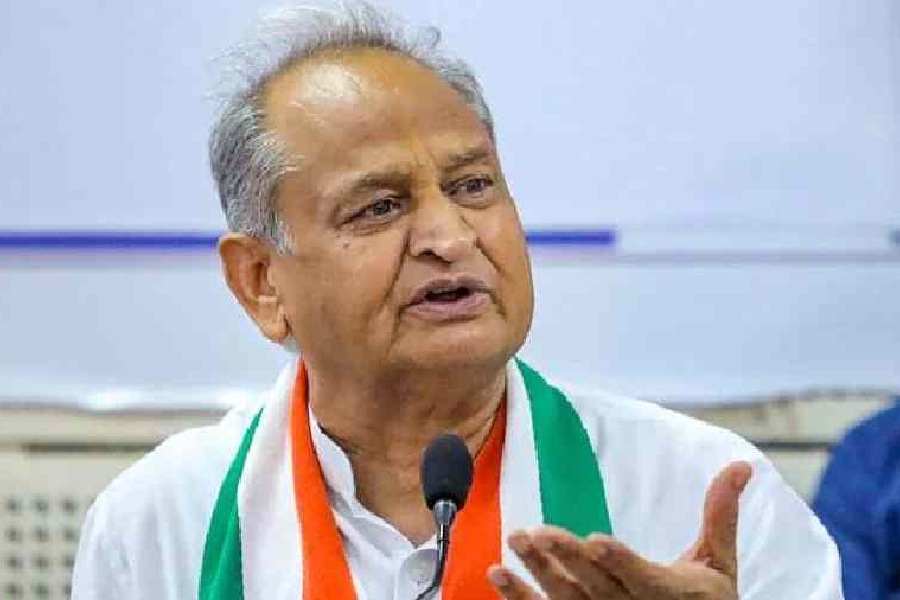Rajasthan Assembly Elections 2023: Congress workers protest against some sitting MLAs, CM Ashok Gehlot says…

Rajasthan Assembly Elections 2023: Congress workers protest against some sitting MLAs, CM Ashok Gehlot says…
The situation within the Rajasthan state unit of the Indian National Congress (INC) appears to be contentious, with demands from certain party workers to refrain from nominating specific sitting Members of the Legislative Assembly (MLAs) for the upcoming assembly polls. These calls highlight internal dissension and reflect the need for the party to carefully consider candidate selection to ensure favorable outcomes in the imminent elections.
In response to these demands, the Congress‘ Rajasthan state election committee convened discussions at the party’s war room in Jaipur to deliberate on potential candidates for the upcoming polls. This internal meeting indicates the party’s commitment to address the concerns of its workers and strategize for the forthcoming electoral contest.

Simultaneously, reports suggest that demonstrations were staged by party workers from various constituencies outside the meeting venue, presumably to voice their opposition to the nomination of specific sitting MLAs. These protests imply that there might be disagreements within the party ranks concerning the suitability of certain incumbents, potentially reflecting wider concerns over performance or public sentiment.
The timing of these developments, with the polling dates already announced, underscores the urgency for the Congress to resolve internal conflicts and present a united front for the upcoming elections. A cohesive and strategic approach to candidate selection and addressing the concerns of party workers is critical for the party’s success in the electoral battle and for maintaining its political standing within the state of Rajasthan.

The recent protests by Congress workers in Rajasthan, specifically from the Kaman, Sawai Madhopur, Kishanpole, and Sardarshahar constituencies, have shed light on the internal turmoil within the party regarding the selection of candidates for the upcoming November 25 polls. These protests, reportedly accompanied by slogans urging the party to refrain from nominating certain MLAs, underscore the dissatisfaction and disapproval among the party workers towards the incumbent MLAs in these constituencies.
Notably, the names of some sitting MLAs, including Zahida Khan from Kaman, Danish Abrar from Sawai Madhopur, Amin Kagzi from Kishanpole in Jaipur, and Anil Sharma from Sardarshahar in Churu, have emerged as the focal points of dissent. Workers from Sawai Madhopur have accused Danish Abrar of neglecting their concerns over the course of his tenure, creating a sense of disenchantment among the party workers. This sentiment was further reinforced by claims that Abrar’s potential nomination would lead to an inevitable defeat for the party.
Similarly, the discontent within the Kaman constituency, particularly against Zahida Khan, signifies a broader sentiment of displeasure among party workers, suggesting that the incumbent’s actions or decisions might not align with the aspirations and expectations of the local party base.
The emergence of such grievances and dissent among the party workers indicates the necessity for the Congress leadership to carefully consider the concerns raised by the grassroots workers and make strategic decisions that resonate with the sentiments and aspirations of the electorate. The management of such internal conflicts is crucial for the party’s unity and effectiveness in the upcoming elections.
The comments made by Rajasthan Chief Minister Ashok Gehlot regarding the recent protests and dissent within the Congress party indicate a cautious approach toward interpreting the motivations behind the demonstrations. Gehlot’s suggestion of the possibility of a conspiracy and his acknowledgment of the common occurrence of adverse comments during the election season imply a careful assessment of the situation to distinguish between genuine concerns and potentially manipulative actions.
Emphasizing that comments made during such charged political environments might not always reflect the complete truth, Gehlot’s remarks underscore the need for a balanced perspective in evaluating the claims and demands put forth by the protesting workers. By highlighting the complexities surrounding such situations, Gehlot seems to be urging for a thorough and fair consideration of all viewpoints before arriving at any conclusions.
Furthermore, Congress’ Rajasthan election committee head and state party chief Govind Singh Dotasra’s statement underlines the party’s commitment to listening to the concerns of its workers. Dotasra’s assurance of conveying the workers’ feedback to the screening committee suggests an inclusive and participatory approach in the decision-making process, indicating the party’s willingness to consider the sentiments of its grassroots workers.
These statements collectively reflect a measured response by the party leadership, emphasizing the significance of comprehensive deliberation and prudent decision-making in navigating the internal challenges and concerns within the party ahead of the upcoming elections.






